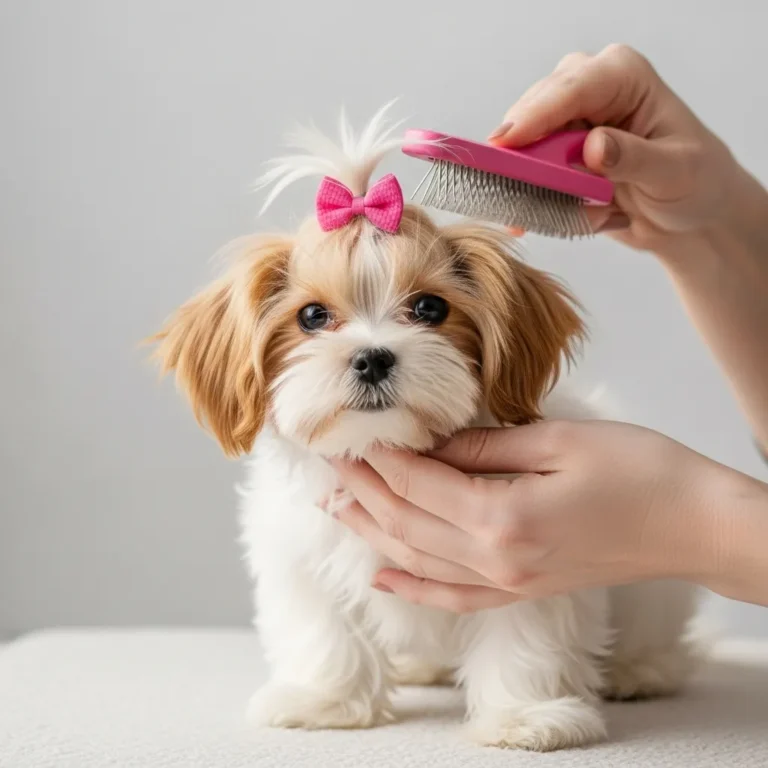
Author: DogsBlogSS Team
⚠️ Disclaimer: This article is for informational purposes only and is not a substitute for consulting a veterinarian.
yorkie shih tzu mix
What is a Yorkie Shih Tzu Mix (Shorkie)?
A Shorkie is a designer hybrid dog — a cross between the Yorkshire Terrier (Yorkie) and the Shih Tzu. Despite not being a formally recognized breed by major kennel clubs like the AKC, this mix has gained popularity because it combines the Yorkie’s feisty, spirited nature with the Shih Tzu’s soft, affectionate temperament. According to PetMD:, Shorkies are relatively new crosses, and since there’s no official breed standard, each pup can vary quite a bit in looks and personality.
According to caninejournal: This mix often arises out of the desire for a small companion dog: someone who’s tiny enough to sit in your lap but energetic enough to join in play or short walks. As Canine Journal notes, the Shorkie is “a small toy dog … slip straight into your purse with no issues.
What Does a Shorkie Look Like?
Shorkies can have a wide variety of appearances, and that’s part of their charm. Their size typically ranges: According to caninejournal males are around 6–9 inches from paw to shoulder, while females tend to be slightly smaller. Weight varies between 4 to 11 pounds, depending on the individual.
According to breedscout: puts their life expectancy at around 12–15 years.
According to nahf: In terms of coat, Shorkies often inherit soft, silky hair. The mix of the Yorkie’s fine hair and the Shih Tzu’s denser outer coat means some Shorkies have more flowing fur, while others are more manageable.
According to caninejournal: Their colors are as varied as their personalities — you might see anything from classic black-and-tan to white, silver, liver, or gold, depending on which parent’s genes dominate.
According to dogpackapp: Their facial features also vary: some lean more toward the flat muzzle of a Shih Tzu, while others have the more pointed, refined muzzle of a Yorkie. Their ears may stand up like a terrier or flop like a Shih Tzu’s, making each Shorkie uniquely expressive.
Are Shorkies Good Family Dogs?
According to PetMD: Yes — in many cases, Shorkies make wonderful family dogs. They are typically very loyal, affectionate, and eager to be close to their humans. According to PetMD, both parent breeds were bred to be companion dogs, so Shorkies often crave company and will happily snuggle up with their people.
Their small size also makes them well suited for apartment life, and their moderate energy level means they don’t need huge yards — but they do appreciate daily interaction and play.
According to thegoodypet: That said, because of their petite build, supervision is important when they’re around small children or larger pets, to avoid accidental injury.
Do Shorkies Shed a Lot?
According to tidybarks: A common question! The short answer is: not excessively, but “low shedding” doesn’t mean “no shedding.” Shorkies, especially those whose coats lean toward their Yorkie heritage, often shed very little. TidyBarks describes them as “low-shedders” and notes that their coat can develop a smell if not bathed regularly.
However, some owners report more shedding than expected — particularly when a pup is shedding its puppy coat and growing into its adult fur:
According to reddit: “They still shed, but they don’t have an undercoat … If her coat has changed, she’s likely losing her puppy coat and growing in her adult coat.”
So, while you might hear that Shorkies are hypoallergenic or very low-shedding, the reality depends quite a bit on the individual pup. Regular brushing and grooming help a lot.
Are Shorkies High-Maintenance?
According to caninejournal: In some ways — yes. Their coat care can demand consistent effort. Canine Journal points out that many Shorkie owners choose a teddy-bear cut to make grooming more manageable, because long fur can tangle easily.
According to petscare: According to PetsCare.com, a typical grooming routine includes daily brushing, a professional trim every 6–8 weeks, regular baths, ear cleaning, nail trimming, and weekly dental care.
So while they’re not the most low-maintenance dogs, they’re not the highest either — it’s just a matter of being consistent and having the right tools and routines.
Temperament & Personality
What Is the Typical Temperament of a Shorkie?
According to rover: Shorkies are often tiny powerhouses. According to Rover.com, they have “big personalities and sharp minds.”
According to petmd: They’re loyal and affectionate, wanting to be close to their favorite people — they might jump into your lap, or follow you from room to room just to be near you. PetMD describes them as social dogs that enjoy companionship, whether that’s with children, adults, or even other pets (with proper introductions).
According to rover: They’re also quite intelligent. But because they’re small and sensitive, they often respond best to gentle, positive reinforcement training — not harsh correction. Rover.com suggests short training sessions, since Shorkies can get easily distracted.
Are Shorkies Aggressive?
According to tidybarks: Generally, no. They’re not known for undue aggression, but like many small dogs, they can be “yappy” or protective. TidyBarks notes that Shorkies may bark readily and warn their owners about perceived threats — despite their diminutive size.
That said, with early socialization and proper training, they can be taught healthy boundaries.
Are Shorkies Good with Children and Other Pets?
According to petmd: With the right socialization, many Shorkies are great with kids and other animals. PetMD cautions, though, that because Shorkies are so small (often around 7–10 inches tall and under 16 pounds), interactions with small children or large pets should be supervised to ensure everybody stays safe.
According to caninejournal: On the other hand, Canine Journal emphasizes the importance of early socialization — especially to prevent overprotectiveness or excessive barking. When properly socialized, Shorkies can grow up to be outgoing, friendly, and well-adjusted.
Do Shorkies Bark a Lot?
According to thegoodypet: Yes — it’s not uncommon for Shorkies to be quite vocal. Their Yorkie side contributes a strong watchdog instinct, and their small stature doesn’t always stop them from alerting loudly. According to The Goody Pet, Shorkies are “very yappy dogs who will bark at everything and nothing.”
If you’re okay with a bit of barking — or willing to work on training — this might not be a deal-breaker. But if you’re seeking a very quiet dog, it’s something to consider.
Are Shorkies Easy to Train?
According to rover: They can be, but patience is key. Rover.com recommends positive reinforcement training and warns that Shorkies may be prone to separation anxiety if not taught to be comfortable being alone. Short and consistent sessions often work best, since they may have shorter attention spans.
Good early socialization helps a lot too — exposing them to different people, places, and experiences in puppyhood goes a long way toward building confidence and reducing fears.
Care & Health
What Are Common Health Problems in Shorkies?
According to PetMD: Because Shorkies inherit traits from two small breeds, there are several health issues to watch out for. PetMD outlines a few of the most common ones:
- Patellar Luxation: This is when the kneecap dislocates from its normal groove. Small breeds like Shorkies are especially prone to it.
- Periodontal Disease: Their tiny jaws and crowded teeth make them more susceptible to gum disease.
- According to PetMD: Tracheal Collapse: Due to their small windpipe, they can develop a weakening of the cartilage in their trachea, leading to a honking cough and breathing issues. PetMD recommends walking them with a harness instead of a collar to avoid putting pressure on their windpipe.
- According to caninejournal: Eye Problems: Inherited from the Shih Tzu side, Shorkies may face conditions like glaucoma or lens luxation.
- According to thegoodypet: Respiratory Issues: Because some Shorkies have a brachycephalic (short) muzzle, they may struggle with breathing, especially in hot weather. The Goody Pet highlights this risk.
- According to thegoodypet: Liver / Portosystemic Shunt: Some sources, like The Goody Pet, note that this is a concern: if the liver can’t properly filter toxins, this condition can become serious.
- According to petmoo: Hypoglycemia: Low blood sugar is more common in toy breeds — PetMoo and others mention that Shorkies may not store glucose well, so careful feeding and monitoring are essential.
How Long Do Shorkies Usually Live?
According to breedscout: On average, 12–15 years, according to several sources. BreedScout gives this life expectancy.
According to thegoodypet: The Goody Pet echoes a similar range.
According to nahf: Some earlier sources (like Nahf.org) suggest they can live even up to 16 years or more with proper care.
Of course, genetics, diet, vet care, and lifestyle all play big roles in how long any individual dog lives.
How Much Exercise Does a Shorkie Need?
According to caninejournal: Not huge amounts, but they do need regular activity to stay happy and healthy. According to Canine Journal, about 30 minutes of exercise per day is a good guideline. This could be a brisk walk, playtime indoors, or interactive games.
According to petmd: Because of potential breathing issues (especially in warmer weather), it’s best to keep exercise moderate and monitor your Shorkie closely. PetMD also recommends making sure play is safe and not overexerting them.
What Kind of Grooming Does a Shorkie Require?
Grooming is one of the areas where a Shorkie can demand real, consistent attention — but it’s also deeply rewarding when done with care.
- According to rover: Brushing: To prevent mats and tangles, daily brushing is ideal if the coat is long. Shorter “puppy cuts” require brushing a few times a week to stay neat. Rover.com suggests brushing daily or every other day.
- According to petscare: Bathing: Every 2–4 weeks is common, depending on how dirty they get, according to some guides. PetsCare.com recommends this regular bath schedule.
- According to haircutstyles: Professional Grooming: Visiting a groomer every 6–8 weeks helps maintain the coat length, especially for trims around the face, ears, and paws. HaircutStyles.net explains that grooming intervals depend on coat type: silky coats may need grooming every 4–6 weeks, while wavy ones might go 6–8 weeks between trims.
- According to caninejournal: Dental Care: Because of their tiny mouths, Shorkies are prone to dental issues. Weekly tooth brushing with dog-safe toothpaste is strongly recommended.
- Ears & Nails: Clean ears regularly and trim nails as needed — typical grooming maintenance, but especially important for toy breeds.
- Eyes: Keep an eye on them (pun intended). Shorkies can suffer from eye conditions, so check for redness, discharge, or cloudiness.
What’s the Best Diet for a Shorkie?
Nutrition for a Shorkie needs to be thoughtful, due to their small size and some of their metabolic vulnerabilities.
- According to caninejournal: Quality Food: Feed them a high-quality, balanced kibble formulated for toy or small breeds. Canine Journal recommends choosing a food that’s nutrient-rich but has appropriately sized kibble.
- According to thegoodypet: Meal Frequency: Because they can be prone to hypoglycemia, it’s often best to divide their daily food into multiple small meals rather than one or two large ones. The Goody Pet suggests this to help maintain stable blood sugar.
- According to petmd: Supplements: Only with veterinary advice. According to PetMD, you probably don’t need to supplement if they’re eating a complete and balanced diet, unless your vet recommends something specific.
- According to petmd: Treats & Calories: Watch how many treats you give — in a small dog, treat calories add up fast. PetMD advises limiting treats to less than 10% of daily caloric intake.
How Much Do Shorkie Puppies Cost?
According to caninejournal: According to Canine Journal, a Shorkie puppy typically costs between $500 and $1,000, depending on breeder, generation (first generation vs later), and location. According to Canine Journal
Second-generation Shorkies (Shorkie x Shorkie) often cost more because breeders aim for more predictable traits — but that premium comes with a bit more certainty about size, temperament, and appearance.
Living with a Shorkie
Are Shorkies Good for Apartment Living?
According to petmd: Absolutely — Shorkies are very well-suited to apartment life. Their small size means they don’t need a large backyard, and with around 30 minutes of daily activity, you can easily meet their exercise needs indoors or with a short walk. PetMD highlights that they adapt well to small living spaces.
That said, because they can be barkers, you may need to work on training and boundaries to avoid noise becoming a problem for neighbors.
Do Shorkies Get Along with Cats?
According to petmd: Yes, they can — especially if they’re introduced properly and early. Because Shorkies are social and affectionate, they often enjoy the company of other animals. According to PetMD, with supervision and gradual introduction, many Shorkies can live harmoniously with cats or other pets.
Personality matters a lot, though. Some Shorkies may be more territorial or watchful, depending on their temperament and training.
What Should I Know Before Getting a Shorkie Puppy?
Here are some key considerations to keep in mind:
- According to petmd: Breeder Matters: Because Shorkies are not a standardized breed, choosing a reputable breeder who tests for genetic health issues (like patellar luxation or liver shunts) is especially important. PetMD strongly recommends working with breeders who prioritize health over appearance.
- Socialization: Start socializing your Shorkie from a young age — expose them to different people, animals, environments, sounds, and gentle handling. This helps curb overprotectiveness and barking.
- Training Style: Use positive reinforcement. Shorkies respond best to treats, praise, and short, consistent training sessions.
- Grooming Commitment: Be ready for regular grooming. Daily brushing, routine teeth cleaning, and grooming appointments are part of the deal.
- Veterinary Care: Regular check-ups are essential. Monitor for breathing issues, dental problems, and joint health.
- According to rover: Time & Attention: These dogs are social; they love being around people. If you leave them alone for long periods, separation anxiety can develop. Rover.com recommends teaching independence early.
Where Can I Find a Reputable Shorkie Breeder or Rescue?
Because Shorkies are designer dogs, there isn’t a one-stop registry like for purebred dogs. But you can still find trustworthy sources:
- Reputable Breeders: Look for breeders who health-test their parent dogs (for patellar luxation, tracheal collapse, liver shunts, etc.). Ask for genetic test results, meet the parent dogs, and check the breeder’s references.
- Rescues and Shelters: Sometimes Shorkies or Shih Tzu–Yorkie mixes end up in breed-specific rescues or small dog rescue organizations. Websites like Petfinder or Adopt-a-Pet may list Shorkies or crossbreeds.
- Breed Clubs: Though Shorkie isn’t a recognized breed, groups and communities (on social media or local dog clubs) can sometimes point you to breeders who are ethical and health-conscious. Also, talk to a veterinarian for referrals — many vets know responsible local breeders.
- Adoption Events: Attend small-breed rescue events in your area. You may meet mix dogs, including Shorkies, who are looking for homes.
Conclusion
If you’re thinking about welcoming a yorkie and shih tzu mix, or Shorkie, into your home, it’s helpful to know exactly what you’re signing up for. These little dogs can bring enormous joy, loyalty, and personality into your life — but they also benefit from dedicated care.
A yorkie and a shih tzu mix is not just a “cute purse-sized dog.” They’re social, loving, and confident in their tiny bodies. Their grooming needs and sensitivity to health issues require someone who’s willing to invest time and heart into their care.
But for the right person or family — someone who has room for snuggles, play, and maybe a little barking — a shih tzu and yorkie mix could be a wonderful companion for years to come. With proper care, training, and love, they thrive, and the bond you build will be something special.
Notice : The DogsBlogSS editorial team is dedicated to providing accurate, research-based information about dog health, behavior, and care. All our articles are fact-checked using trusted veterinary sources such as VCA Hospitals, Merck Vet Manual, and the AKC.
you may like it




sources
- https://www.petmd.com/dog/breeds/shorkie
- https://www.rover.com/blog/shorkie-breed-profile-the-ultimate-shih-tzu-yorkie-mix-guide-for-new-owners/
- https://www.dogster.com/dog-breeds/shorkie-tzu
- https://www.purina-arabia.com/find-a-pet/dog-breeds/shorkie
- https://dogtime.com/dog-breeds/shorkie
- https://caninejournal.com/shorkie/
- https://spiritdogtraining.com/breeds/shorkie/


